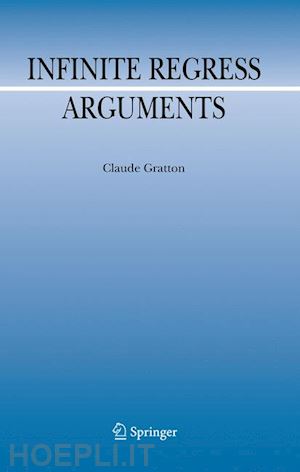
Questo prodotto usufruisce delle SPEDIZIONI GRATIS
selezionando l'opzione Corriere Veloce in fase di ordine.
Pagabile anche con Carta della cultura giovani e del merito, 18App Bonus Cultura e Carta del Docente
Infinite regresses (e.g., event3 caused event2, event2 caused event1, ad infinitum; statement3 justifies statement2, statement2 justifies statement1, ad infinitum) have been used as premises in arguments on a great variety of topics in both Eastern and Western philosophy since ancient times. They are part of a philosopher's tool kit of argumentation. But how sharp or strong is this tool? How effectively is it used? The typical presentation of infinite regress arguments throughout history is so succinct and has so many gaps that it is often unclear how an infinite regress is derived, and why an infinite regress is logically problematic, and as a result, it is often difficult to evaluate infinite regress arguments. These prevalent consequences indicate that there is a need for a theory to re-orient our practice. After well over two thousand years of using infinite regresses as premises, one would have expected that at least some theory of infinite regress arguments would have emerged. None exists. There have been only a few articles on infinite regress arguments, but they are based on the examination of only a small number of examples, discuss only a few logical or rhetorical aspects of infinite regress arguments, and so they help to meet the need for a theory in only a limited way.
Given the situation, I examined many infinite regress arguments to clarify the various aspects of the derivation of infinite regresses, and explain the different ways in which certain infinite regresses are unacceptable. My general approach consisted of collecting and evaluating as many infinite regress arguments as possible, comparing and contrasting many of the formal and non-formal properties, looking for recurring patterns, and identifying the properties that appeared essential to those patterns. The six chapters of this book gradually emerged from this approach. Two very general questions guided this work: (1) How are infinite regresses generated in infinite regress arguments? (2) How do infinite regresses logically function in an argument? In answering these questions I avoided as much as possible addressing the philosophical content and historical background of the arguments examined. Due to the already extensive work done on causal regresses and regresses of justification, only a few references are made to them. However, the focus is on other issues that have been neglected, and that do contribute to a general theory of infinite regress arguments: I clarify the notion of an infinite regress; identify different logical forms of infinite regresses; describe different kinds of infinite regress arguments; distinguish the rhetoric from the logic in infinite regress arguments; and discuss the function of infinite regresses in arguments. The unexamined derivation of infinite regresses is worth deriving – to discover what we have kept hidden from ourselves, improve our ways of constructing and evaluating these arguments, and sharpen and strengthen one of our argumentative tools. This work is one example of empirical logic applied to infinite regress arguments: "the attempt to formulate, to test, to clarify, and to systematize concepts and principles for the interpretation, the evaluation, and the sound practice of reasoning" (Finocchiaro, M. Arguments about Arguments, Systematic, Critical and Historical Essays in Logical Theory. P48).











Il sito utilizza cookie ed altri strumenti di tracciamento che raccolgono informazioni dal dispositivo dell’utente. Oltre ai cookie tecnici ed analitici aggregati, strettamente necessari per il funzionamento di questo sito web, previo consenso dell’utente possono essere installati cookie di profilazione e marketing e cookie dei social media. Cliccando su “Accetto tutti i cookie” saranno attivate tutte le categorie di cookie. Per accettare solo deterninate categorie di cookie, cliccare invece su “Impostazioni cookie”. Chiudendo il banner o continuando a navigare saranno installati solo cookie tecnici. Per maggiori dettagli, consultare la Cookie Policy.